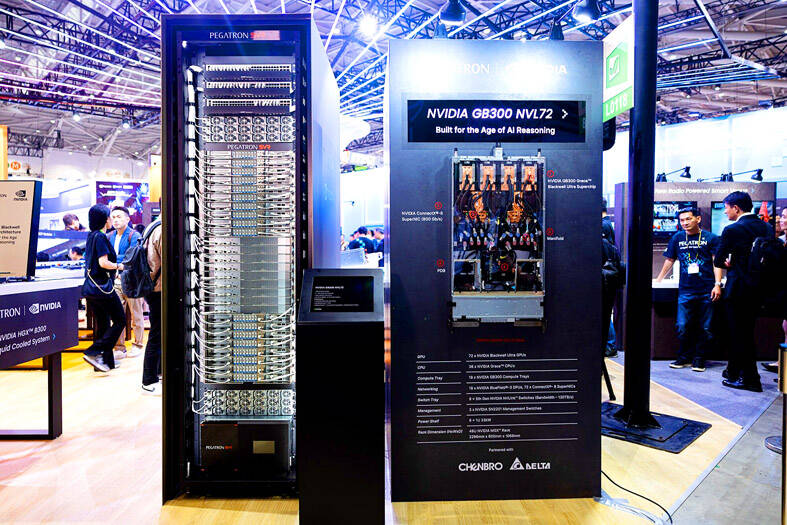Dynapack International Technology Corp (順達), which makes lithium battery packs used in notebook computers and backup battery units (BBU) for servers powered by Nvidia Corp chips, yesterday cut its revenue forecast to an annual decline of up to 20 percent, attributable to adverse impact from strong appreciation of the New Taiwan dollar and price competition.
Three months ago, the company estimated revenue this year would slide about 10 percent from NT$13.91 billion (US$472.2 million) last year, due to an intensifying pricing war for the lithium battery packs used in notebook computers.
Recent appreciation of the NT dollar against the US dollar added to the already weak information-technology (IT) sector revenue and ate into the gross margin of those products, company president Chang Chung-hsing (張崇興) told investors.

Photo: Annabelle Chih, Bloomberg
Considering the foreign exchange fluctuations, Dynapack now expects revenue to shrink at a deeper rate of between 15 and 20 percent annually, Chang said.
However, non-IT sector revenue, mostly from BBUs, would continue to grow, Chang added.
The company stuck to its original estimate of 100 percent annual growth to reach NT$1.5 billion this year, as it seeks to supply its BBU to new customers and for new artificial intelligence server racks, Chang said.
“We are optimistic about the BBU business,” Chang said.
“The adoption of BBU by data center operations is gaining traction amid concern of data loss,” he said.
BBUs are integrated with server racks, providing rapid failover protection and becoming essential for uninterrupted operations for data centers.
Overall, non-IT business is expected to make up about 30 to 40 percent of the company’s total revenue this year, while IT business would account for 60 to 70 percent, Chang said.
Dynapack also said that it is expanding BBU capacity in Taiwan and Thailand.
With rising revenue contribution from BBUs, Dynapack expects gross margin in the second half to bounce back to more than the 15 percent registered in the first quarter this year, surpassing the first half, as BBUs deliver much higher margins than the corporate average.
Gross margin improved to 14.36 percent from 11.6 percent, thanks to favorable product products and a bigger revenue share of non-IT products, the company said.
Net profit plunged 53 percent year-on-year to NT$757 million during the first two quarters of this year, compared with NT$1.56 billion in the same period last year, it said.
The year-on-year reduction was due to lack of a significant asset disposal gains in the first half of last year, company spokesperson Lin Yu-Huei (林郁蕙) told investors.
Earnings per share (EPS) dipped to NT$4.96 from NT$10.31.
Despite lower EPS in the first two quarters, Lin assured investors that the company aims to pay more than NT$10 in its cash dividend next year, as asset disposal gains would be included in the payment.

NEW IDENTITY: Known for its software, India has expanded into hardware, with its semiconductor industry growing from US$38bn in 2023 to US$45bn to US$50bn India on Saturday inaugurated its first semiconductor assembly and test facility, a milestone in the government’s push to reduce dependence on foreign chipmakers and stake a claim in a sector dominated by China. Indian Prime Minister Narendra Modi opened US firm Micron Technology Inc’s semiconductor assembly, test and packaging unit in his home state of Gujarat, hailing the “dawn of a new era” for India’s technology ambitions. “When young Indians look back in the future, they will see this decade as the turning point in our tech future,” Modi told the event, which was broadcast on his YouTube channel. The plant would convert

‘SEISMIC SHIFT’: The researcher forecast there would be about 1.1 billion mobile shipments this year, down from 1.26 billion the prior year and erasing years of gains The global smartphone market is expected to contract 12.9 percent this year due to the unprecedented memorychip shortage, marking “a crisis like no other,” researcher International Data Corp (IDC) said. The new forecast, a dramatic revision down from earlier estimates, gives the latest accounting of the ongoing memory crunch that is affecting every corner of the electronics industry. The demand for advanced memory to power artificial intelligence (AI) tasks has drained global supply until well into next year and jeopardizes the business model of many smartphone makers. IDC forecast about 1.1 billion mobile shipments this year, down from 1.26 billion the prior

People stand in a Pokemon store in Tokyo on Thursday. One of the world highest-grossing franchises is celebrated its 30th anniversary yesterday.

Zimbabwe’s ban on raw lithium exports is forcing Chinese miners to rethink their strategy, speeding up plans to process the metal locally instead of shipping it to China’s vast rechargeable battery industry. The country is Africa’s largest lithium producer and has one of the world’s largest reserves, according to the US Geological Survey (USGS). Zimbabwe already banned the export of lithium ore in 2022 and last year announced it would halt exports of lithium concentrates from January next year. However, on Wednesday it imposed the ban with immediate effect, leaving unclear what the lithium mining sector would do in the